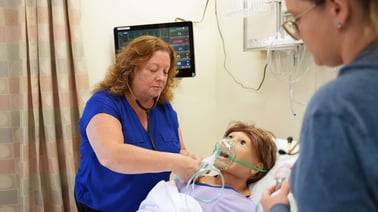Respiratory Care Curriculum
As a respiratory care student, you will work with a wide variety of patients who have breathing or airway problems.
This degree program provides a broad academic background that will prepare you to play a critical role in the treatment and caring for patients for cardiopulmonary disorders.
Coursework will include arts and sciences courses in addition to your professional Respiratory Care core curriculum and clinical practice. Throughout your program, you will complete a minimum of 896 clinical hours. While your coursework will be completed online, your clinical hours will be hands-on learning at one of our clinical partner facilities.
You may be eligible for transfer credit for courses you've previously completed elsewhere. You can read more in our Transfer Credit Policy.
